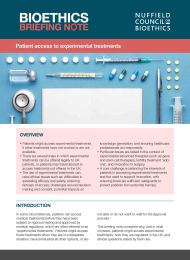Patient access to experimental treatments
Policy Briefing
Published 20/11/2018

Regulation and governance
There are several ways in which experimental treatments can be supplied and offered to patients within the UK legal and regulatory framework.* There is uncertainty about how some medical treatments will be regulated when the UK leaves the EU, although the UK regulatory body for medicines and devices has stated a commitment to continuing close working relationships with European partners.
Regulation of product supply
Medicines must have marketing authorisation (a licence) before they can be supplied in the UK, from either the UK authority – the Medicines and Healthcare products Regulatory Agency (MHRA) – or the European Commission (EC) after assessment by the European Medicines Agency (EMA). The licence is issued following evidence gathering and clinical trials to assess a medicine’s safety, quality, and efficacy, and commits the manufacturer to ongoing drug safety monitoring. However, EU Regulation includes a provision for compassionate use of unauthorised medicines. In the UK, the specials exemption allows the supply of an unlicensed medicine on request from a healthcare professional in order to treat a patient in their care where no equivalent licensed treatment is available. The early access to medicines scheme (EAMS) gives UK manufacturers a route to offering medicines 12-18 months before they have been licensed. Manufacturers can apply if they have promising scientific evidence on efficacy, and there is a clear unmet medical need.
Medical devices and implants must have a CE mark, which certifies that they meet European safety and performance standards, before they can be supplied in the UK.16 However, clinicians and manufacturers can apply to the MHRA for exceptional use of a medical device that has not been CE-marked if there is no certified device available that meets the needs of an individual patient. The device manufacturer must provide evidence of safety and the clinician must provide justification for its use. Under the in-house manufacture exemption, devices that are made in a healthcare establishment can be used for patients within that establishment without certification.
Advanced therapies, such as stem cell and gene therapies, must have a centralised European marketing authorisation, granted by the EC following assessment by the EMA, before they can be supplied in the UK and Europe.19 However, the hospital exemption allows ‘non-routine’ use of custom-made advanced therapies provided they are manufactured in authorised facilities and used in the same member state. There is no requirement to notify the MHRA of treatments offered under the hospital exemption.20 The specials exemption can apply to advanced therapies as well as medicines, where no equivalent licensed treatment is available.
Regulation of medical practice
General Medical Council (GMC) guidance states that healthcare professionals must provide effective treatments based on the best available evidence, and that patients must be told whether a proposed treatment is experimental and about any additional risks or uncertainties. Beyond this, and within the constraints of available funding, it is up to healthcare professionals to judge what treatment to offer based on their knowledge of the patient. This can involve administering or prescribing unlicensed treatments, or prescribing licensed medicines or CE-marked medical devices ‘off-label’, which means for a use or purpose different to that for which they have been licensed. This could include use for a different dosage, a different duration of treatment, or in a different patient group, such as a drug which has only been licensed for adults being prescribed to a child, or a different disease.
Following a legal challenge mounted by two pharmaceutical companies, a UK Court recently affirmed that the drug Avastin, a licensed cancer treatment, can be prescribed off-label for a common eye condition which it is also known to be effective for.
Emergency situations
In a rapidly spreading epidemic or other emergency situation with high mortality rates it might not be possible to initiate clinical trials immediately, and national authorities can allow experimental treatments as part of the emergency response.26
* Other relevant regulations exist that cover the management of hospitals and clinics, the use of human tissue, product safety, tort law, and consumer protection. These areas are regulated by various bodies and legislation including the Care Quality Commission, the Human Tissue Authority, and the Consumer Rights Act 2015.

Share